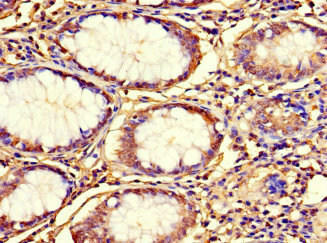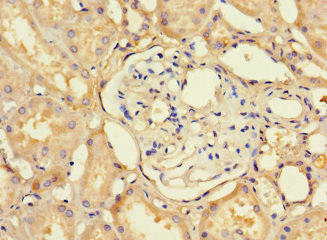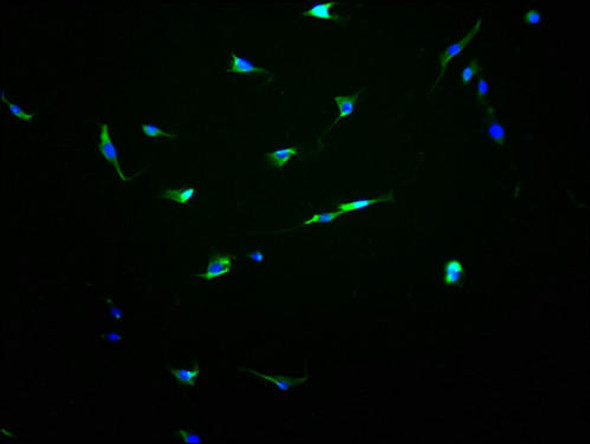Description
| Antibody Name: | C12orf65 Antibody (PACO47142) |
| Antibody SKU: | PACO47142 |
| Size: | 50ug |
| Host Species: | Rabbit |
| Tested Applications: | ELISA, IHC |
| Recommended Dilutions: | ELISA:1:2000-1:10000, IHC:1:20-1:200 |
| Species Reactivity: | Human |
| Immunogen: | Recombinant Human Probable peptide chain release factor C12orf65, mitochondrial protein (36-166AA) |
| Form: | Liquid |
| Storage Buffer: | Preservative: 0.03% Proclin 300 Constituents: 50% Glycerol, 0.01M PBS, PH 7.4 |
| Purification Method: | >95%, Protein G purified |
| Clonality: | Polyclonal |
| Isotype: | IgG |
| Conjugate: | Non-conjugated |
 | Immunohistochemistry of paraffin-embedded human colon cancer using PACO47142 at dilution of 1:100. |
 | Immunohistochemistry of paraffin-embedded human kidney tissue using PACO47142 at dilution of 1:100. |
| Background: | May act as a codon-independent translation release factor that has lost all stop codon specificity and directs the termination of translation in mitochondrion. May help rescuing stalled mitoribosomes during translation (By similarity). |
| Synonyms: | Probable peptide chain release factor C12orf65, mitochondrial, C12orf65 |
| UniProt Protein Function: | C12orf65: May act as a codon-independent translation release factor that has lost all stop codon specificity and directs the termination of translation in mitochondrion. Defects in C12orf65 are the cause of combined oxidative phosphorylation deficiency type 7 (COXPD7). A mitochondrial disease resulting in encephalomyopathy. Clinical manifestations include psychomotor delay and regression, ataxia, optic atrophy, nystagmus and muscle atrophy and weakness. Belongs to the prokaryotic/mitochondrial release factor family. 2 isoforms of the human protein are produced by alternative splicing.Protein type: Translation; RNA-bindingChromosomal Location of Human Ortholog: 12q24.31Cellular Component: mitochondrionMolecular Function: translation release factor activityBiological Process: translational terminationDisease: Combined Oxidative Phosphorylation Deficiency 7 |
| UniProt Protein Details: | |
| NCBI Summary: | This nuclear gene encodes a mitochondrial matrix protein that appears to contribute to peptide chain termination in the mitochondrial translation machinery. Two different 1 bp deletions (resulting in the same premature stop codon)result in decreased mitochondrial translation, decreased levels of oxidative phosphorylation complexes and encepthalomyopathy. Alternative splicing results in multiple transcript variants. [provided by RefSeq, Aug 2010] |
| UniProt Code: | Q9H3J6 |
| NCBI GenInfo Identifier: | 219879802 |
| NCBI Gene ID: | 91574 |
| NCBI Accession: | NP_001137377.1 |
| UniProt Secondary Accession: | Q9H3J6,Q8WUC6 |
| UniProt Related Accession: | Q9H3J6 |
| Molecular Weight: | 18,828 Da |
| NCBI Full Name: | probable peptide chain release factor C12orf65, mitochondrial |
| NCBI Synonym Full Names: | chromosome 12 open reading frame 65 |
| NCBI Official Symbol: | C12orf65 |
| NCBI Official Synonym Symbols: | SPG55; COXPD7 |
| NCBI Protein Information: | probable peptide chain release factor C12orf65, mitochondrial |
| UniProt Protein Name: | Probable peptide chain release factor C12orf65, mitochondrial |
| UniProt Synonym Protein Names: | |
| Protein Family: | Probable peptide chain release factor |
| UniProt Gene Name: | C12orf65 |
| UniProt Entry Name: | CL065_HUMAN |






